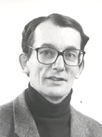
Ghislain de Marsily
for his pioneering and innovative development
of quantitative and stochastic hydrogeology as a
multidisciplinary science and as an accepted method of solving problems of
applied hydrology, and for his long devotion to creating a new and
exciting learning experience in modern water science for his students
Ghislain' s contribution to the science of hydrogeology is multi-faceted: surface watershed management, sedimentary basin modelling, fractured rock hydrology, contaminant transport in porous or fractured media and (radioactive) waste disposal to name only a few. Four books, about 85 articles, 200 conference papers, 150 technical, have been produced during his scientific career of 27 years.
Ghislain' s broad knowledge, clarifying answers and illuminating advise in hydrogeological science has made him a sought after expert adviser, especially in the area of radioactive waste disposal such as the French and European Nuclear Waste Programmes. Ghislain is a member of the US National Academy of Sciences and of the Academia Europea. His talent and work has lead to several awards, where among recently the Chevalier de la Légion d'Honneur (1996).
Recently, Ghislain has been invited to express his view on the entanglement of hydrogeological science and politics. Pollution of drinking water resources by herbicides, pesticides and nitrates is a major problem in most industrialized countries. Ghislain is the author of the concept "Hydrogeological Natural Parks", which suggests a protective action to prevent the degradation of ground water resources. This idea is presently gaining momentum, especially in France, e.g. the city of Auxerre (Yvonne) has taken up the concept and decided to create such a protected area for its groundwater resources and is developing new agricultural practices in cooperation with the farming community.
These qualities and scientific contributions to hydrogeological science make him an excellent candidate for the Dalton Medal.